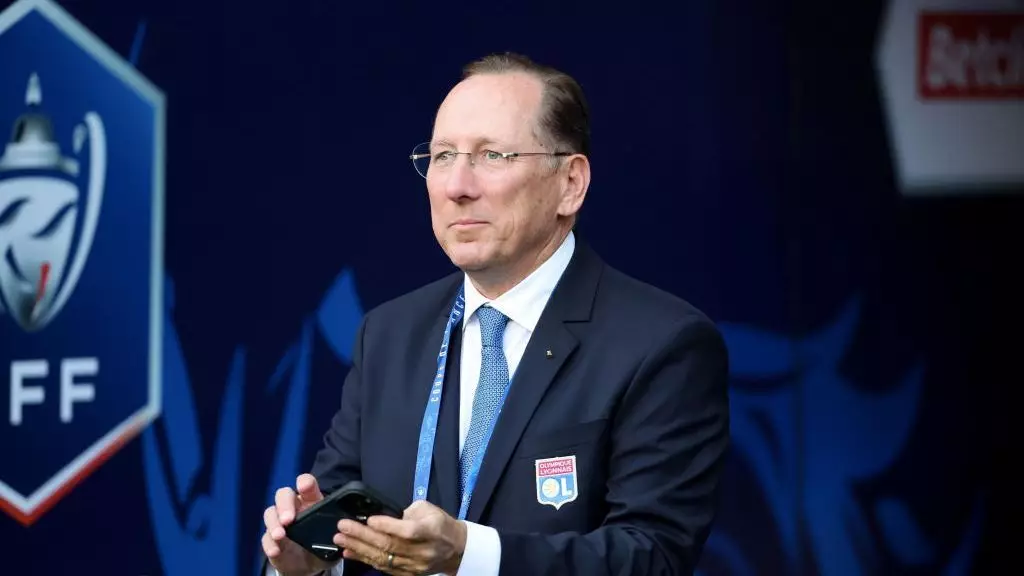In the heated world of football, tensions often flare between club owners and executives, revealing deeper issues within the sport. The latest skirmish involves Lyon’s American owner John Textor, who recently launched a scathing critique of Nasser Al Khelaifi, the president of Paris Saint-Germain (PSG), and Vincent Labrune, the head of Ligue 1. During an appearance on French radio RMC, Textor unveiled his concerns regarding the influence of Al Khelaifi over French football, unraveling a narrative about power, conflict of interest, and the integrity of the league.
Textor’s discontent resonates from his perception of an entrenched power structure that compromises the integrity of Ligue 1. He explicitly labeled Labrune as PSG’s “lapdog,” implying that the head of the league is far too submissive to Al Khelaifi’s interests, given his dual role as head of the BeIn Sport media group. This relationship brings forth questions about impartial governance in a league land dominated by a singular entity. Textor expressed shock over the dynamics at a recent meeting of Ligue 1 presidents, claiming that Al Khelaifi, a vested party in TV rights—an issue central to league revenues—usurped the agenda and leadership role that Labrune should have upheld.
In Textor’s eyes, the situation is intolerable: “I wasn’t aware of the protection that comes institutionally,” he stated, highlighting his ignorance of the extent of Al Khelaifi’s influence prior to his involvement with Lyon. This insight speaks to Textor’s struggles to navigate a landscape where individual ambitions might overshadow collective welfare.
In response to Textor’s accusations, PSG swiftly rebuffed his comments, branding them as a reflection of his lack of class and understanding of French football culture. The club’s statement was both defensive and derisive, suggesting that Textor’s “rude and dense excessiveness” demonstrates a disconnect from the realities of Ligue 1 dynamics. The retort from PSG starkly illustrates the chasm between Textor’s criticism and the club’s stance, which maintains that their institutional practices and leadership are untouchable.
Essentially, while Textor voices a call for accountability and better governance, PSG’s dismissal of his remarks adds layers to the ongoing feud, transforming it into a clash of perceptions about authority and integrity in football management. The stark contrast in their viewpoints raises larger questions about transparency and the availability of checks and balances in football governance.
The Implications of Power Dynamics
Textor’s statement that Al Khelaifi’s dominance extends beyond PSG to the European Club Association and UEFA’s executive committee shines a spotlight on the complexities of football governance today. His predicament reveals a broader concern: how can leagues maintain integrity when significant financial interests are at stake? As clubs grapple with financial sustainability amid burgeoning broadcasting revenues, the susceptibility to monopolistic practices rises, jeopardizing not only competitive balance but the league’s reputation.
Moreover, Textor’s admission of his initial unfamiliarity with the intricacies of this power structure suggests that new owners may find themselves ill-equipped to navigate entrenched and often convoluted networks of influence. His experience underscores the need for a more comprehensive understanding of existing power dynamics for stakeholders entering this fiercely competitive sphere.
The ongoing rift between John Textor, Nasser Al Khelaifi, and the Ligue 1 hierarchy serves as a striking reminder of the urgent need for reform in football governance. As Textor continues to voice his concerns, he not only sheds light on the complexities and challenges facing Ligue 1 but also invites other stakeholders to reflect on the integrity and future of the sport. For a league that prides itself on competitive integrity, the call for change cannot be overstated. As voices like Textor’s resonate louder, it is essential for the governing bodies and club owners alike to address and rectify the issues at hand, lest they risk alienating fans and undermining the very essence of football.

Leave a Reply